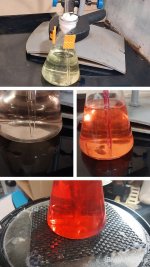- Joined
- Dec 4, 2021
- Messages
- 426
- Solutions
- 1
- Reaction score
- 409
- Points
- 63
Thank you so much for the easy and detailed synth description!
How about the hydrogen peroxide, could that be substituted? It's a really controlled chemical nowadays, and a bitch to synthesize yourself. Its mainly there as a catalyst in the reaction between the glacial acetic acid and the 3-methyl-4-phenyl-3-buten-2-one, right? What could be a good substitute?
How about the hydrogen peroxide, could that be substituted? It's a really controlled chemical nowadays, and a bitch to synthesize yourself. Its mainly there as a catalyst in the reaction between the glacial acetic acid and the 3-methyl-4-phenyl-3-buten-2-one, right? What could be a good substitute?
Last edited:

